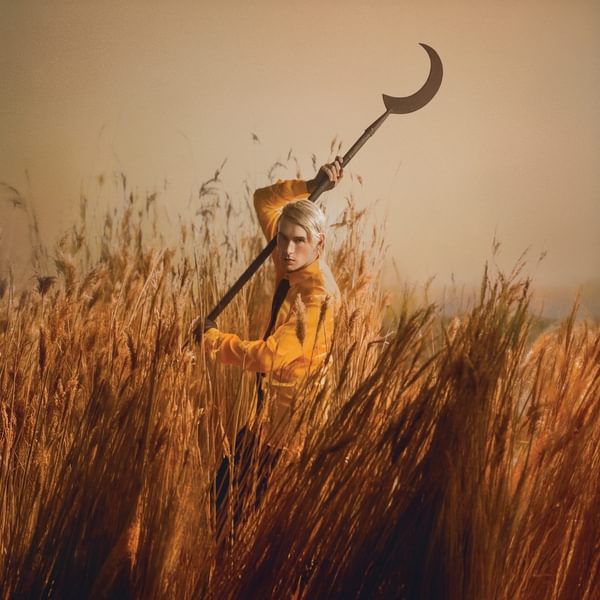"One Day I'm Going To Soar"

It took more than a decade, largely until its 1997 reissue on Creation Records, for the last album from Dexys Midnight Runners, 1985′s Don’t Stand Me Down, to accrue the status it now comfortably holds as a singular classic. Post-’Come On Eileen’, a soul-baring confessional, laced with mid-song conversations, reflections on Kevin Rowland’s own Irish childhood and musical references plucked from all over the place, on which only two tracks came in at under five minutes (and one stretched past twelve), made by people in Ivy League suits not prepared to play the publicity game any more wasn’t what anyone expected, or wanted at the time, in the wake of that year’s Live Aid-encompassing pop superstar foundation. Since then Rowland has made a commercially and critically unsuccessful solo album, fallen into a decade of drug addiction, ended up bankrupt and homeless, made a comeback covers album more famous for its cover than its contents, reformed the band for a joyous 2003 tour where reworking the old hits managed to please hipster and hen party alike, and watched from the sidelines as his reputation grew.
And so, having been promising new material since 2004, the story comes full circle. Rowland, long having come to terms with his past and what he means to some, has recalibrated the now shortened of name Dexys, chiefly backed by Pete Williams and Big Jim Paterson from the original line-up and Mick Talbot, briefly a member around 1981 but better known from the Style Council. Rowland still clearly means every word, radiating his long-established inherent belief in sincerity, honesty and purity through music (cf ‘Until I Believe In My Soul’, ‘Knowledge of Beauty/My National Pride’) but with the knowledge and self-awareness that comes from understanding and coming through the other side.
Naturally, it’s also almost heroically out of its time once again. Willie Mitchell’s Muscle Shoals studio Memphis soul sound, more restrainedly folk/countrified than the blazing horns and “Celtic Soul” of yore is the common musical thread around which spin the grandstanding, the theatricality and above most other things the constant self-examination. Much of this is filtered through Rowland’s (relatively) latter-day preoccupation with examining his Irish heritage, a rootless soul searching for a consistent explanatory identity, with a side order narrative of love in a mentally cold climate.
Loosely the album can be split into three parts, the first three tracks kind of acting as pacenotes for Rowland’s story so far. ‘Now’ opens as a sobbing piano and strings ballad before breaking into a lightly funky trot in which Kevin first sketches out a escape fantasy and then seems to pull away from it, perhaps through experience (“I’ve got to make a life that’s good for me”). This is followed by the elegant, eventually waltzing ‘Lost’, recalling childhood summers in much the same headspace of “how my life could be full of music, girls and clothes, I dreamed about beauty” before snapping and admitting “I was lost inside”. In a notably broad Irish accent he then tells himself “now you’ve grown… it’s time you stopped the dreaming, faced up to reality”, presaging the quasi-autobiographical black mirror of success loneliness confessional ‘Me’ (“all these people are depending on me… I don’t know who’s friend or foe”), featuring two casual mid-song conversations of the kind derived straight from Don’t Stand Me Down.
With the self-lacerating self-analysis out of his system, the middle part forms the narrative of a self-aborted love affair, starting with the descriptive desire from afar of ‘She Got A Wiggle’ through the point of obsession, set to a sensuous Al Green shuffle while betraying “a desperate need to own you in every way I can”, ‘Thinking Of You’ borrowing the close-miked, dead set near-stalker darkness at uncomfortable length of Elvis Costello’s ‘I Want You’, though the supper club sax solo five minutes in is as good an indication as any that it’s too long. By ‘I’m Always Going To Love You’ Kevin’s got the girl and then suddenly drops her, leading to the self-explanatory ‘Incapable Of Love’. This part, unfortunately, doesn’t really work as it needs to to following the length and depth of the emotional build-up, the narrative twist dragged back by the leaden disco-esque backing on the former, the Crosby/Hope cabaret musical style of the latter and Rowland’s female foil, actress Madeleine Hyland, evidently theatre trained and sounding odd when required to argue against Kevin’s apologetically conversational style.
Any ground lost here, though, is comfortably made up on the last three tracks, the last act returning to thoughts of roots and lack of identity. The countrified, introverted ‘Nowhere Is Home’ catches Rowland pondering where he fits in and reconciling the past and hoped-for escape of the future, amid more cross-examining talk of free-spirited notions and the kind of blunt defence – “take your Irish stereotype and shove it up your arse” – that he first raised back on Dexys’ 1980 debut single ‘Dance Stance’. The opened-up Northern Soul stomp ‘Free’ sees some light emerge and an epiphany of what personal freedom means before the glorious final resolution of ‘It’s OK John Joe’. Over a Satie-like piano part Rowland delivers a monologue, supposedly a pep talk to another party but more clearly a conclusion to his self-doubt, a summation of everything Rowland has strived since the dead end of the ’70s to get across in his music (“I don’t show much of myself in life, but in my music I tend to put it all in – it’s like I’ve got a need to get it all out of me”) and by extension his private life (“I still believe in love, I just don’t know what it is”), breaking out into the odd gently crooned jazzy chorus.
At the very end, the stomp of ‘Free’ suddenly returns like shafts of light into the darkest recesses. It seems in the moment like the ultimate metaphor. As we leave his story Rowland seems resigned to loneliness and being stuck in one place but still somehow hopeful, optimistic but accepting that it’s fine to recognise your faults and limitations, honest to many a fault. He’s already suggested this album is it as far as Dexys goes. Perhaps he recognises he has no further to go in opening his heart and emotions and letting the reactions of his deepest recesses gush forth. Idiosyncratic throughout, intangibly glorious for its faults, his and Dexys’ unique place is sealed and complete.
Get the Best Fit take on the week in music direct to your inbox every Friday

Patrick Wolf
Crying The Neck







